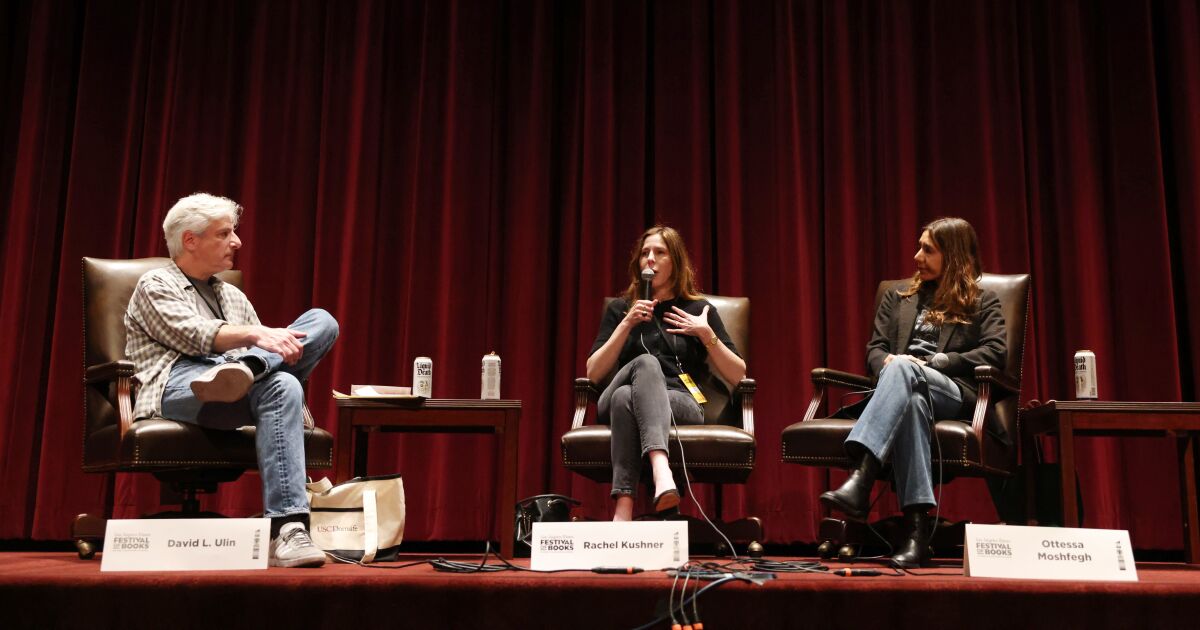
On the very hot, very exciting first day of the Los Angeles Times Festival of Books, Rachel Kushner, author of the epic “The Flamethrowers,” and Ottessa Moshfegh, author of the punishing “Lapvona,” settled into the packed seats of USC’s Norris Theatre, speaking to author David Ulin about “what fiction has to offer” and bringing their analogue sensibilities to a very online fan base.
“It’s hard for me to talk about this without writing another novel to demonstrate,” Moshfegh dead-panned, addressing the question posed by the panel’s title.
In fact, both authors have a lot to offer at a time when it’s not so easy for literary novelists to capture public attention (the occasional Sally Rooney bucket hat, notwithstanding). Describing Kushner and Moshfegh as cult figures might seem like a way to blow off the impact of their work, but it’s truly the opposite. On this panel, as in their interview, they resemble a cool lit girl mafia. Bookstagrammers have tote bags that read, “I survived Lapvona.”
One young audience member wanted to confirm that Moshfegh was aware of her cult status. “Do you know you are all over TikTok? She’s all over Pinterest! I have a poster of ‘My Year of Rest and Relaxation’ in my dorm room. If I see a girl with that book, I think, ‘You’ve got mental issues, too.’ I mean, are you aware that you have a cult following?”
Moshfegh demurred. “I am … aware. But not in the sense that you are.” This prompted laughter from the audience, but Moshfegh was serious. “Do you know what I mean? That would be impossible. I’m aware of the popularity of the book, and I’m glad that you liked it and that it’s leading you to reading.”
Ulin worked to flesh out the panel’s ostensible theme. “I guess we can start with this broad prompt given the fact that we live in a culture that seems confused about fact and fiction,” he offered. “Who wants to go first?” Neither Kushner nor Moshfegh raised their microphones. “Well,” Ottessa ventured, “I never think of this culture as being confused! I think the zone of fiction, for me, is a zone that will last forever. It’s a way for me to understand myself but also to understand others. It’s very specific for me.”
“I’m trying to learn about classical music,” Kushner said. “And the thing with classical music is that it’s supposed to be a language for feelings that don’t have any other outlet. Fiction does the same thing. The modalities and currents — of our lives.”
“When I was young I used to read everything,” Moshfegh responded. “But now I find that I’m hypersensitive to fiction. It overwhelms me. Even books like Rachel’s, which I love, I have to excrete. The more I ingest, the more I excrete.”
Ulin remarked on the fact that Moshfegh’s first books had all been written in the first person, and “Lapvona” is written in the third.
“I felt that I had finished with the first person,” Moshfegh explained. “I wanted to see how tightly I could grip my pen but how far my arms could stretch.” Kushner revealed that she is working on a new novel — much to the excitement of everyone present — told entirely in the first person.
Though Kushner and Moshfegh have collaborated on a screenplay, they balked at the idea of giving up control of their fiction. When an audience member asked if they would ever collaborate on fiction and “how the table would be set,” Moshfegh honestly replied, “I would actually go crazy. The table would have to be set with someone who was mute.”
“I agree,” Kushner replied. “There’s only room for one driver in fiction.”












